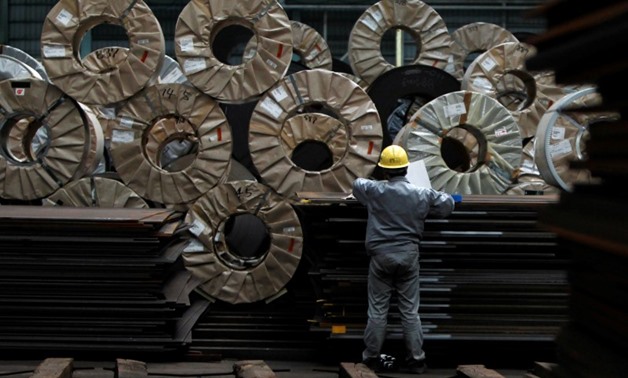
FILE PHOTO - A worker checks steel coils and steel sheets at a distribution warehouse in Urayasu, east of Tokyo April 19, 2012. REUTERS/Toru Hanai/File Photo
TOKYO – 13 September 2017: Japanese wholesale prices rose at the fastest annual pace in nearly nine years in August as robust Chinese demand boosted commodity prices, offering glimmers of hope consumer inflation will accelerate toward the central bank’s 2 percent target.
But some analysts warn the pick-up in wholesale inflation won’t be strong enough to nudge companies into boosting retail goods prices.
“The rise was driven mostly by items affected a lot by global commodities prices,” such as crude oil and metal goods, said Toru Suehiro, senior market economist at Mizuho Securities.
“Inflationary pressure remains weak for items like machinery,” he said, adding that wholesale inflation will likely peak around October.
Wholesale prices rose 2.9 percent in August from a year earlier, increasing for the eighth straight month and marking the fastest pace of growth since October 2008, Bank of Japan data showed on Wednesday.
The rise in the corporate goods price index (CGPI), which measures the price that firms charge each other for their goods and services, was roughly in line with a median market forecast for a 3.0 percent increase. The July gain was 2.6 percent.
The increase was driven largely by rising import prices of crude oil, scrap metal and other commodities on robust demand from China, the data showed.
Overall final goods prices - the prices of finished products charged to businesses - rose 1.4 percent from a year earlier, the data showed.
Domestic final goods prices, which loosely track the consumer price index, rose 0.7 percent from a year earlier.
Japan’s economy expanded at an annualized rate of 2.5 percent in the second quarter thanks to robust exports and a long-awaited pick-up in private consumption.
But core consumer prices rose just 0.5 percent in July from a year earlier, well below the BOJ’s elusive 2 percent target, as companies remain hesitant to pass along rising labor and raw material costs to households.
The BOJ has had to push back the timing for reaching its price target six times since it deployed its massive stimulus programme in 2013.
It now hopes consumer inflation will hit its target by March 2020, as signs of strength in the economy and a tight job market boost wages and give households more purchasing power, thereby allowing firms to hike prices.

Comments
Leave a Comment